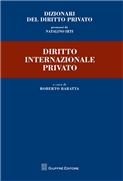As announced in the past months, on 16 March 2011 the Commission presented the proposals for two regulations on property rights of “international” married couples and registered partnerships:
- Proposal for a Council Regulation on jurisdiction, applicable law and the recognition and enforcement of decisions in matters of matrimonial property regimes, COM(2011) 126 of 16 March 2011;
- Proposal for a Council Regulation on jurisdiction, applicable law and the recognition and enforcement of decisions regarding the property consequences of registered partnerships, COM(2011) 127 of 16 March 2011.
The proposals are accompanied by a Communication from the Commission “Bringing legal clarity to property rights for international couples” – COM(2011) 125 of 16 March 2011 – which describes the difficulties faced by international couples in the current framework of EU legislation and national rules of the 27 Member States (see also the figures presented in the press release and the related FAQs).
The origin of the initiative dates back to the early days of the “communitarisation” of the conflict of laws. According to the Explanatory Memorandum to doc. COM(2011) 126:
The adoption of European legislation on matrimonial property regimes was among the priorities identified in the 1998 Vienna Action Plan. The programme on mutual recognition of decisions in civil and commercial matters adopted by the Council on 30 November 2001 provided for the drafting of an instrument on jurisdiction and the recognition and enforcement of decisions as regards ‘rights in property arising out of a matrimonial relationship and the property consequences of the separation of an unmarried couple’. The Hague programme, which was adopted by the European Council on 4 and 5 November 2004, set the implementation of the mutual recognition programme as a top priority and called on the Commission to submit a Green Paper on ‘the conflict of laws in matters concerning matrimonial property regimes, including the question of jurisdiction and mutual recognition’, and stressed the need to adopt legislation by 2011.
A thorough research on the matter was previously carried in 2003 at an academic level, on behalf of the Commission, by the TMC Asser Instituut and the Département de droit international of the Catholic University of Leuven (UCL) (the whole study – Final Report in French and Country Reports on the legislation of Member States – can be downloaded from the Documentation Centre of the DG Justice, Freedom and Security). The Green Paper on conflict of laws in matters concerning matrimonial property regimes, including the question of jurisdiction and mutual recognition, was published on 17 July 2006, and received nearly forty replies in the public consultation launched by the Commission.
The 2009 Stockholm Programme came back to the need of European legislation in the field, stating that mutual recognition should be extended to matrimonial property regimes and the property consequences of the separation of unmarried couples. The need was further stressed in the ‘EU Citizenship Report 2010: Dismantling the obstacles to EU citizens’ rights‘ (p. 5 ff.), adopted on 27 October 2010, where the Commission announced for 2011 an official legislative initiative. The drafting of the proposals is summarised as follows in the Explanatory memorandum:
A group of experts, PRM/III, was set up by the Commission to draw up the proposal. The group was made up of experts representing the range of professions concerned and the different European legal traditions; it met five times between 2008 and 2010. The Commission also held a public hearing on 28 September 2009 involving some hundred participants; the debates confirmed the need for an EU instrument for matrimonial property regimes that covered in particular applicable law, jurisdiction and the recognition and enforcement of decisions. A meeting with national experts was held on 23 March 2010 to discuss the thrust of the proposal being drafted.
Finally, the Commission conducted a joint impact study on the proposals for Regulations on matrimonial property regimes and the property consequences of registered partnerships. [see doc. n. SEC(2011) 327 fin. and SEC(2011)328 fin. of 16 March 2011]
Pursuant to Art. 81(3) TFEU the proposed regulations, as “measures concerning family law with cross-border implications”, are subject to a special legislative procedure: the Council shall act unanimously, after consulting the European Parliament. The second subparagraph of Art. 81(3), however, provides a “passerelle-clause”, under which “the Council, on a proposal from the Commission, may adopt a decision determining those aspects of family law with cross-border implications which may be the subject of acts adopted by the ordinary legislative procedure”. The third subparagraph of the provision grants to national Parliaments of the Member States a veto power, to be exercised within six months of the notification of the Commission’s proposal to enact the “passerelle”.

